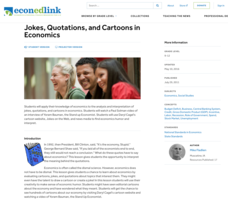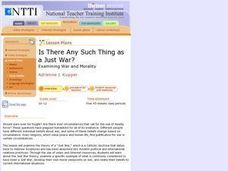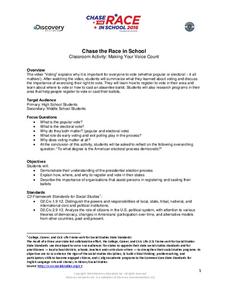DocsTeach
Introduction to the Domino Theory and Containment Policy in Vietnam
Scholars analyze a propaganda poster against communism. The resource uses the poster to examine the domino theory and containment policies used by the United States to stop the spread of communism in Vietnam. Scholars work in pairs or...
Curated OER
True Spin: Music
Upper graders take a critical look at art criticism, music, and politics. They watch one segment of "True Spin," produced by VH1 music television and then discuss myths that relate to art and music. Several modern songs are analyzed...
Simon & Schuster
Curriculum Guide to: The Prince by Niccolò Machiavelli
A 20-page curriculum guide for Niccolo Machiavelli's The Prince includes five lessons and related worksheets. For background, class members research and create travel brochures for Florence, Italy, in 1500. Next, they analyze...
Curated OER
New Gun Control Politics: A Whimper, Not a Bang
Using an article from The New York Times, students answer discussion questions about gun control. They are divided into four groups to research different standpoints on gun control, including the Executive Office, Congress, Gun Control...
Curated OER
Compare the United States Government with Other Political Systems
Students explore the U.S. form of government and illustrate other forms of government found throughout the world. They explain the similarities and differences between the U.S and other governments.
Roy Rosenzweig Center for History and New Media
Slaves and Indentured Servants
In theory, at least, indentured servitude and slavery were two different practices in the American colonies. Class groups conduct a close reading of two primary source documents, one written by a slave and one by an indentured servant,...
Curated OER
Team Works
Students define "group" and list American social and political movements throughout history. They examine one model of a successful team and positive group mentality by reading and identify the traits of a successful group and those of...
Foreign Policy Research Institute
The Mind of a Terrorist: A Psychosocial Perspective
What a great way to make a psychology lesson plan on personality development socio-politically relevant! Class members investigate causes of radicalism--specifically, becoming a terrorist. This resource includes background information,...
Council for Economic Education
Jokes, Quotations, and Cartoons in Economics
Humor offers a great tool teach the basics of economics to scholars via video clips, satire, and political cartoons. Individuals create their own economic humor to present to the class—with the assistance of Daryl Cagel's online...
Curated OER
Is There Any Such Thing As A Just War?
Students examine the Just War theory, examine a specific example of what is commonly considered to have been a Just War, develop their own moral viewpoints on war, and relate their beliefs to current international situations.
North Carolina School of Science and Mathematics
Henry Kissinger and Detente
How did relations between the United States and the People's Republic of China evolve between 1950 and 1970? Your young historians will complete a timeline of events with evidence that the relationship between these two great nations was...
Curated OER
Art and War
Young scholars analyze the war art of Pablo Picasso. In this art analysis activity, students define political art and explore Picasso's response to war in his art. Young scholars complete image based discussion and two related activities.
Curated OER
A New Society Project
Ninth graders examine the social and political movements of the Gilded Age and Progressive Era. In this American history lesson, 9th graders work in groups to form their own society and laws. Students make a diagram of their town and...
Curated OER
Chapter 10: "Currents of Change in the Northeast and the Old Northwest" Chapter 11: "Slavery and the Old South"
Students use the indicated text and the internet to compare and contrast the North and South. They discuss the social and political implications of the two predominant economic systems (slavery and factory). They are introduced to the...
Nebraska Department of Education
Laws that Isolated and Impoverished the Irish
Students identify the reasons for the mass starvation in Ireland in the 1800's. They analyze the historical and political forces that caused the famine and discuss the potato blight itself in detail.
Curated OER
Why Does Evolution Matter Now?
Students are shown why they should care about evolution. They become specialists in one sphere influenced by evolution and then share their findings with their group. Students are lead into a class discussion, so that each student can...
Heritage Foundation
The Constitution, Federalism, and the States
The divide between federal and state government is responsible for much of tension that continues to this day, partly because of the US Constitution. The activities in the 14th lesson in a series of 20 are designed to help learners...
Heritage Foundation
The Amendment Process and the Bill of Rights
Did you know that lawmakers have proposed more than 5,000 bills to amend the US Constitution in Congress? Your class learns intriguing facts about the process of choosing amendments. A variety of activities including before and after...
Annenberg Foundation
Exploring Borderlands
What motivated Europeans to explore the New World, and what effects did their exploration have on Native American populations? The second installment of a 16-part American Passages series prompts pupils to watch a video and read several...
Discovery Education
Making Your Voice Count
As learners watch a video on voting, they take notes on a worksheet that lists various voting topics, including electoral and popular votes, early voting, and exit polling. Then, young people research the Internet for their state's...
Core Knowledge Foundation
Genetics and the Master Race
How did the beginnings of genetic research influence the Nazi party? A thorough, engaging unit incorporates the work of Gregor Mendel, the study of inherited traits, and the use of racism and discrimination during the Holocaust.
Curated OER
Lesson: Ginger Brooks Takahashi: Powerstich: A Forum for Community-Building
This is a great way to build community in your school, experience process-based art, and explore the critical-thinking process. While quilting as a class collectively (just like a quilting bee) pupils listen to poetry and prose of a...
National Gallery of Canada
Being a Photojournalist
Tell a story with images. Learners view several photojournalistic photos before agreeing on a message to convey with their own photo stories. In small groups, they take and select photos to include in their final project.
Curated OER
Understanding the Declaration of Independence
Students work in groups to do a document analyxix of several documents. Students view the Martin Luther King speech, "I Have a Dream." They discuss the Battle of Saratoge. Students give a personal view of the reason the Declaration of...

























